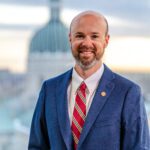2017 marks the 500-year anniversary of the event that sparked the Protestant Reformation. On October 31, 1517, an Augustinian monk with a carpenter’s mallet nailed 95 theses to the door of the church of Wittenberg to call for a public debate over the sale of indulgences. This monk, whom we know as Martin Luther, dared to assume that the doctrines and practices of the medieval church were not above biblical scrutiny. Luther’s conscience, as he would later declare, was held captive to the Word of God, not the institutions and traditions of men. Luther’s conviction regarding the primacy of Scripture led him to recognize two different realms (or kingdoms) of authority. There was the kingdom of Christ, which was a spiritual realm, and there was the kingdom of world, which was a natural realm. Luther believed that Christians lived in both realms and had to learn to navigate life in both without conflating the two realms. Luther, however, was not the only reformer who recognized and affirmed distinct realms of authority. John Calvin, a second-generation French reformer, carried the torch that Luther’s lit, arguing not only for two kingdoms of authority but also for the freedom of the believer’s conscience to willingly embrace the commands of the Lord in joyous obedience without compulsion by the law. When Luther’s understanding of two overlapping, yet distinct realms of authority was combined with Calvin’s understanding of the freedom of conscience by later generations of Christians, the foundational principles of religious liberty emerged.
During their lifetimes, however, neither Luther nor Calvin can be considered consistent champions of religious liberty. While both developed theologies of the two-kingdoms and argued for certain principles of freedom, they, like all people, were prone to inconsistency and were men of their era. Neither men could be considered children of the Enlightenment, whose emphasis on individual rights helped pave the way for modern paradigms of religious liberty. For example, on one hand, Luther can be found arguing for the separation of the church from the empire, while on the other, he can be found attempting to use officials in the government to further aspects of his reformation. Such was true of Calvin as well, even though he ministered during a different generation of the Reformation.
Luther and Calvin’s views of the relationship of the government to the church seemed to develop over time. As the reformers transitioned from being a persecuted minority to a popular majority in their regions, their views on the distinctions between church and state began to blur. Luther did not want the empire, who was inextricably tied to the Roman Catholic Church at the time, to have any influence in the life of the Lutheran churches. He also seemed, however, to have no real opposition to the persecution and execution of the Anabaptists, who were simply attempting to follow Zwingli’s reforms to their logical conclusion. Calvin was also complicit in blurring the lines of church and state. This was especially evident in his later writings. In Calvin’s final edition of the Institutes, the divine appointment of the state’s role in the life of the church is clear. Heresy and blasphemy were not simply destructive to the life of the church; they were also a threat to the stability of the state. Hence, when the anti-Trinitarian Michael Servetus stood trial in Geneva, in spite of his personal pleading for him to repent of his heresy, Calvin still endorsed his execution.
In sum, Luther and Calvin’s understanding of religious liberty tended to vacillate depending on their situations. Their example is an important reminder to those of us who admire their contribution to theology and modern society. While there is much to be thankful for in their lives and ministries, especially as it relates to the principles of religious liberty, Luther and Calvin were both flawed and inconsistent men.
As modern observers of the Reformation—and even more so, as Reformation Christians in the Baptist tradition—we must be mindful of the inherent dangers of wedding the church to the government or a political power. Government has the responsibility to reward workers of righteousness and deter workers of unrighteousness. However, when Paul spoke in Romans 13 regarding righteousness and justice, he was not thinking that Rome was to apply the Mosaic law to its citizens. Those laws were for a specific people during a specific time of redemptive history for a specific purpose. Instead, Paul had in mind a more natural understanding of good and evil as understood by all post Flood societies and preserved in the Noahic covenant. A government that rewards good and punishes evil in its natural realm of authority is a good government that should be obeyed by God’s people (1 Pet. 2:14). On the other hand, the church operates in a spiritual realm with the delegated authority of the risen Christ himself. To be sure, these realms of authority will overlap and interact with one another. One cannot affirm the sovereign lordship of Christ, whose lordship shapes consciences, and that lordship not impact people’s relationship to the state as citizens. The gospel is fundamentally a public truth with real implications for our relationship to the natural or political order. Even still, the lines of delineation between the two kingdoms must not be blurred. To be a citizen of the United States is not the same as being a citizen of the Kingdom of Christ. The latter is fundamentally more important than the former.
As Luther and Calvin demonstrated, no degree of theological precision or biblical conservatism is immune to the temptation afforded by political power.
Luther and Calvin’s greatest contributions to religious liberty were in principle, not practice. For while both extolled the sovereignty of God, the ultimate accountability of man to the Scriptures alone, and the freedom of man’s conscience, they also used the government to further aspects of their reformation and condoned the executions of those “guilty” of heresy and blasphemy. Using the power of the state to uphold distinctly ecclesial concerns is not a Reformation practice that contemporary Christians should mimic. As demonstrated by their early lives and writings, it is often those of the persecuted minority who make the greatest ideological contribution to religious liberty. Sadly, as the persecuted minority gained more political influence, they had an awful tendency to become the persecuting majority. For Luther and Calvin, the sobering irony of their journey is that, in a very real sense, at least politically, they became what they protested. Their movement of protest, which sought independence from Rome’s control over earthly empires, became a movement all too willing to use the coercive power of the state.
In the end, the lesson for present-day readers is that we need to think deeply about how the principle of religious liberty should shape and inform our practice of religious liberty advocacy. As Luther and Calvin demonstrated, no degree of theological precision or biblical conservatism is immune to the temptation afforded by political power. Even when one claims that “Scripture alone” is their final authority, it is still easy to forget what belongs to God and what belongs to Caesar (Matt. 22:15-22). Failure to think clearly and consistently in this regard will compromise one’s principled stance on religious liberty. We do not advocate for religious liberty so that we can become the dominant religious influence in a culture or advance our religious ideals alone. We advocate for religious liberty because the conscience of humanity belongs to God, not the government.
This article is from the latest edition of Light Magazine. You can check it out here.











